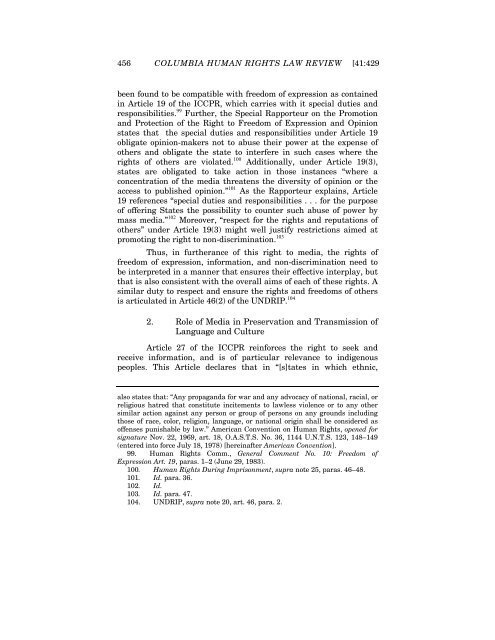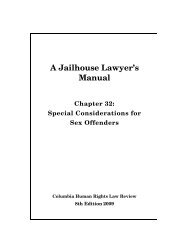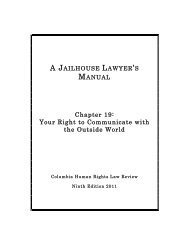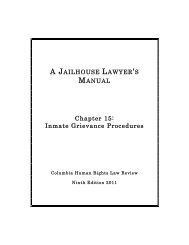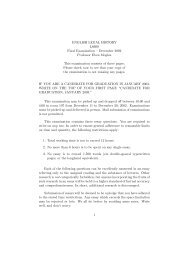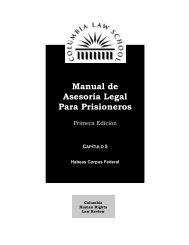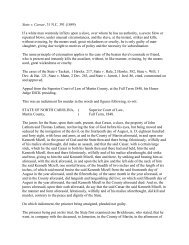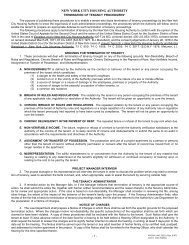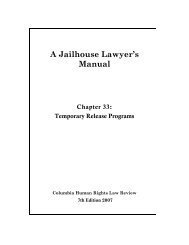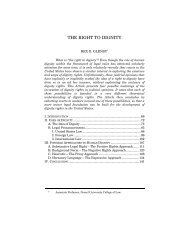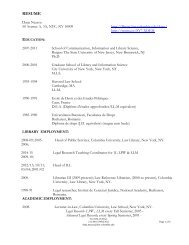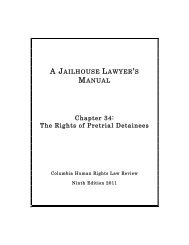A Right to Media? Lorie M. Graham - Columbia Law School
A Right to Media? Lorie M. Graham - Columbia Law School
A Right to Media? Lorie M. Graham - Columbia Law School
You also want an ePaper? Increase the reach of your titles
YUMPU automatically turns print PDFs into web optimized ePapers that Google loves.
456 COLUMBIA HUMAN RIGHTS LAW REVIEW [41:429<br />
been found <strong>to</strong> be compatible with freedom of expression as contained<br />
in Article 19 of the ICCPR, which carries with it special duties and<br />
responsibilities. 99 Further, the Special Rapporteur on the Promotion<br />
and Protection of the <strong>Right</strong> <strong>to</strong> Freedom of Expression and Opinion<br />
states that the special duties and responsibilities under Article 19<br />
obligate opinion-makers not <strong>to</strong> abuse their power at the expense of<br />
others and obligate the state <strong>to</strong> interfere in such cases where the<br />
rights of others are violated. 100 Additionally, under Article 19(3),<br />
states are obligated <strong>to</strong> take action in those instances “where a<br />
concentration of the media threatens the diversity of opinion or the<br />
access <strong>to</strong> published opinion.” 101 As the Rapporteur explains, Article<br />
19 references “special duties and responsibilities . . . for the purpose<br />
of offering States the possibility <strong>to</strong> counter such abuse of power by<br />
mass media.” 102 Moreover, “respect for the rights and reputations of<br />
others” under Article 19(3) might well justify restrictions aimed at<br />
promoting the right <strong>to</strong> non-discrimination. 103<br />
Thus, in furtherance of this right <strong>to</strong> media, the rights of<br />
freedom of expression, information, and non-discrimination need <strong>to</strong><br />
be interpreted in a manner that ensures their effective interplay, but<br />
that is also consistent with the overall aims of each of these rights. A<br />
similar duty <strong>to</strong> respect and ensure the rights and freedoms of others<br />
is articulated in Article 46(2) of the UNDRIP. 104<br />
2. Role of <strong>Media</strong> in Preservation and Transmission of<br />
Language and Culture<br />
Article 27 of the ICCPR reinforces the right <strong>to</strong> seek and<br />
receive information, and is of particular relevance <strong>to</strong> indigenous<br />
peoples. This Article declares that in “[s]tates in which ethnic,<br />
also states that: “Any propaganda for war and any advocacy of national, racial, or<br />
religious hatred that constitute incitements <strong>to</strong> lawless violence or <strong>to</strong> any other<br />
similar action against any person or group of persons on any grounds including<br />
those of race, color, religion, language, or national origin shall be considered as<br />
offenses punishable by law.” American Convention on Human <strong>Right</strong>s, opened for<br />
signature Nov. 22, 1969, art. 18, O.A.S.T.S. No. 36, 1144 U.N.T.S. 123, 148–149<br />
(entered in<strong>to</strong> force July 18, 1978) [hereinafter American Convention].<br />
99. Human <strong>Right</strong>s Comm., General Comment No. 10: Freedom of<br />
Expression Art. 19, paras. 1–2 (June 29, 1983).<br />
100. Human <strong>Right</strong>s During Imprisonment, supra note 25, paras. 46–48.<br />
101. Id. para. 36.<br />
102. Id.<br />
103. Id. para. 47.<br />
104. UNDRIP, supra note 20, art. 46, para. 2.


